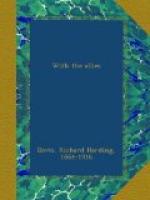The towers still stand, the walls still stand, for beneath the roofs of lead the roof of stone remained, but what is intact is a pitiful, distorted mass where once were exquisite and noble features. It is like the face of a beautiful saint scarred with vitriol.
Two days before, when I walked through the cathedral, the scene was the same as when kings were crowned. You stood where Joan of Arc received the homage of France. When I returned I walked upon charred ashes, broken stone, and shattered glass. Where once the light was dim and holy, now through great breaches in the walls rain splashed. The spirit of the place was gone.
Outside the cathedral, in the direction from which the shells came, for three city blocks every house was destroyed. The palace of the archbishop was gutted, the chapel and the robing-room of the kings were cellars filled with rubbish. Of them only crumbling walls remain. And on the south and west the facades of the cathedral and flying buttresses and statues of kings, angels, and saints were mangled and shapeless.
I walked over the district that had been destroyed by these accidental shots, and it stretched from the northeastern outskirts of Rheims in a straight line to the cathedral. Shells that fell short of the cathedral for a quarter of a mile destroyed entirely three city blocks. The heart of this district is the Place Godinot. In every direction at a distance of a mile from the Place Godinot I passed houses wrecked by shells —south at the Paris gate, north at the railroad station.
There is no part of Rheims that these shells the Germans claim were aimed at French batteries did not hit. If Rheims accepts the German excuse she might suggest to them that the next time they bombard, if they aim at the city they may hit the batteries.
The Germans claim also that the damage done was from fires, not shells. But that is not the case; destruction by fire was slight. Houses wrecked by shells where there was no fire outnumbered those that were burned ten to one. In no house was there probably any other fire than that in the kitchen stove, and that had been smothered by falling masonry and tiles.
Outside the wrecked area were many shops belonging to American firms, but each of them had escaped injury. They were filled with American typewriters, sewing-machines, and cameras. A number of cafes bearing the sign “American Bar” testified to the nationality and tastes of many tourists.
I found our consul, William Bardel, at the consulate. He is a fine type of the German-American citizen, and, since the war began, with his wife and son has held the fort and tactfully looked after the interests of both Americans and Germans. On both sides of him shells had damaged the houses immediately adjoining. The one across the street had been destroyed and two neighbors killed.




